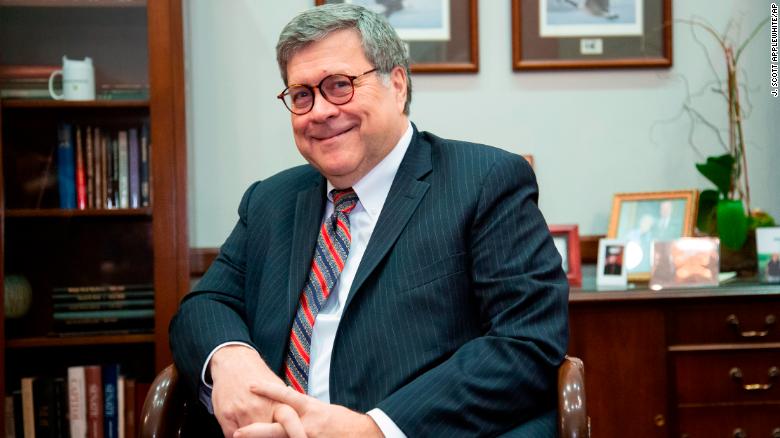Washington (CNN)Attorney General nominee William Barr shared a controversial memo last year with nearly all of President Donald Trump's lawyers concluding that an aspect of special counsel Robert Mueller's case could be "fatally misconceived," Barr acknowledged Monday.
Barr's 19-page memo -- which concluded that Trump's publicly reported interactions with ex-FBI Director James Comey could not constitute obstruction of justice -- was addressed to Deputy Attorney General Rod Rosenstein and Assistant Attorney General Steve Engel and released as a part of Barr's Senate questionnaire last month. But it was previously unclear who else had seen it.
In a letter to Senate Judiciary Chairman Lindsey Graham Monday night, Barr said that he had sent it to White House special counsel Emmet Flood, Solicitor General Noel Francisco, and his former Justice Department colleague Pat Cipollone who is now White House counsel. He also discussed the issues raised in the memo with Trump lawyers Marty and Jane Raskin and Jay Sekulow. In addition he sent a copy, or had a conversation about the contents of the memo with Abbe Lowell, an attorney for Jared Kushner.
In Tuesday's testimony, Barr will say he distributed the memo "broadly" so that other lawyers "would have the benefit of my views." He said the memo was narrow in scope and targeted a specific obstruction of justice theory "under a single statute that I thought, based on media reports, the special counsel might be considering."
"I wrote it myself, on my own initiative, without assistance , and based solely on public information," Barr will say.
But the revelation comes as Democrats have pledged to make Barr's criticisms of Mueller's investigation a centerpiece of the hearings, particularly because Barr would be poised to oversee Mueller's work if confirmed.
Barr discussed the memo with Trump prior to his nomination, according to a source familiar with the discussions, and he will pledge in his confirmation testimony that Mueller will be able to "complete his work." Despite the assurances, Democrats have said they are eager for his testimony.
"My intention will be to get that on the record before I'm satisfied," Sen. Dianne Feinstein, D-California, told reporters after her meeting with Barr.
In December, Feinstein asked both Barr and Attorney General Rod Rosenstein about the 19-page memorandum.
"I read your memorandum with great surprise," Feinstein told Barr in a letter. She said that in all of her years reviewing nominations, she had never seen a nominee write "such an in depth legal memorandum for no reason."
"Your memorandum is not an informal opinion piece or casual commentary;" she said. "Rather, it is a lengthy, detailed legal argument with pointed conclusions," she said.
In his letter to Graham, Barr stressed that the memo analysis was "narrow in scope" and addressed "a single obstruction-of-justice theory under a specific federal statute."
"The memorandum did not suggest that a President can never obstruct justice," Barr wrote. "Quite the contrary, it expressed my belief that a President , just like anyone else, can obstruct justice if he or she engages in wrongful actions that impair the availability of evidence," he wrote.
Barr also said that he wrote it because as a former attorney general he was interested in legal issues of public import. He said that it was not the first time he'd sent a long his views on legal issues of the day. After 9/11 he sent a letter to officials in the Bush administration on his views on the law of wars. He said that "more recently" he'd offered his views to the department on a number of legal issues, such as concerns about the prosecution of Sen. Bob Menendez.
And he said, "I was not representing anyone when I wrote the memorandum, and no one requested that I draft it."
The Justice Department declined further comment on the memo.
"Out of respect for the Senate Judiciary Committee's process, Mr. Barr will address any further questions about the letter at tomorrow's hearing," spokesperson Kerri Kupec said.
CORRECTION: This story has been updated to correct the spelling of the first name of Sen. Lindsey Graham.





